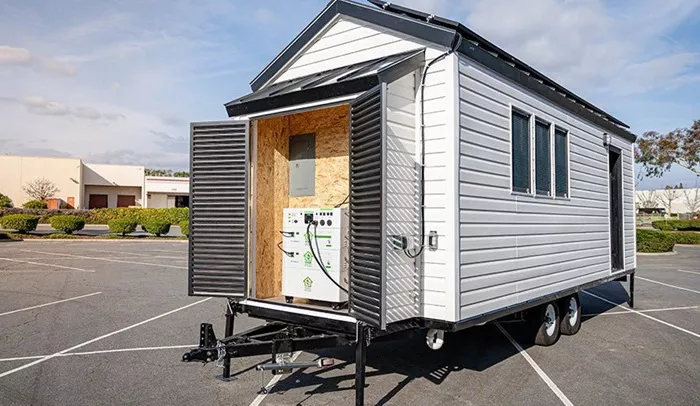When it comes to ensuring your home remains powered during an outage, a home standby generator is an invaluable investment. But with so many options available, how do you determine which one is the best for your needs? In this article, we’ll break down everything you need to know about home standby generators, including how they work, key features to look for, and our top recommendations.
What Is a Home Standby Generator?
A home standby generator is a backup electrical system that automatically provides power to your home during an outage. Unlike portable generators, which require manual setup and fueling, standby generators are permanently installed outside your home and connected directly to your electrical system. They are designed to kick in within seconds of a power failure, ensuring your lights, appliances, and essential systems stay running.
How Does a Home Standby Generator Work?
Home standby generators operate using a combination of advanced electrical and mechanical components. Here’s a simplified breakdown of how they work:
Automatic Transfer Switch (ATS): This is the brain of the system. When the ATS detects a power outage, it signals the generator to start.
Engine: The generator’s engine, typically powered by natural gas or propane, starts up and generates electricity.
Alternator: The alternator converts the mechanical energy from the engine into electrical energy.
Distribution Panel: The electricity is sent to your home’s electrical panel, powering your circuits.
Shutdown: When utility power is restored, the ATS switches back to the main power supply and shuts down the generator.
This seamless process ensures your home remains powered without interruption.
Key Features to Look for in a Home Standby Generator
Choosing the best home standby generator depends on your specific needs. Here are the key features to consider:
Power Output (Wattage)
The generator’s wattage determines how many appliances and systems it can power. Calculate your home’s total wattage needs by adding up the power requirements of essential appliances like refrigerators, HVAC systems, and lights.
For most homes, a generator with 10,000 to 20,000 watts is sufficient.
Fuel Type
Natural Gas: Convenient and cost-effective if you already have a natural gas line.
Propane: Stored in tanks, propane is a reliable option for areas without natural gas access.
Diesel: Less common for residential use but offers high efficiency.
Automatic Transfer Switch (ATS)
A high-quality ATS ensures the generator starts and stops automatically, providing a seamless transition during outages.
Noise Level
Look for generators with noise levels below 70 decibels for quieter operation.
Durability and Warranty
Choose a generator with a sturdy build and a warranty of at least 5 years for peace of mind.
Smart Features
Modern generators often come with Wi-Fi connectivity, allowing you to monitor and control the system via a smartphone app.
Top Home Standby Generator Recommendations
Based on performance, reliability, and customer reviews, here are our top picks for the best home standby generators:
Generac 70432 Home Standby Generator
Power Output: 22,000 watts
Fuel Type: Natural gas or propane
Features: Wi-Fi monitoring, durable engine, and a 5-year warranty.
Why We Recommend It: Generac is a trusted brand, and this model offers ample power for large homes.
Kohler 20RESCL-200SELS
Power Output: 20,000 watts
Fuel Type: Natural gas or propane
Features: Quiet operation, commercial-grade engine, and a 10-year warranty.
Why We Recommend It: Kohler generators are known for their durability and long lifespan.
Champion 14kW Home Standby Generator
Power Output: 14,000 watts
Fuel Type: Natural gas or propane
Features: Affordable, easy installation, and a 10-year warranty.
Why We Recommend It: This model is perfect for mid-sized homes and offers excellent value for money.
Briggs & Stratton 40396
Power Output: 20,000 watts
Fuel Type: Natural gas or propane
Features: Quiet-Test self-diagnostic system, durable construction, and a 5-year warranty.
Why We Recommend It: Briggs & Stratton is a reliable brand, and this generator is packed with user-friendly features.
Installation and Maintenance Tips
Installation
Hire a licensed electrician to install your standby generator. Proper installation ensures safety and compliance with local codes.
Ensure the generator is placed on a level, well-ventilated surface away from windows and doors.
Maintenance
Regular Inspections: Check the oil, coolant, and air filters every 6 months.
Test Runs: Run the generator for 10-15 minutes weekly to ensure it’s functioning properly.
Professional Servicing: Schedule annual maintenance with a certified technician.
Benefits of a Home Standby Generator
Uninterrupted Power Supply: Keep your lights, appliances, and HVAC systems running during outages.
Increased Home Value: A standby generator is a desirable feature for potential buyers.
Peace of Mind: Protect your family and home from the inconveniences of power outages.
Conclusion
Choosing the best home standby generator depends on your power needs, budget, and preferences. Generac, Kohler, Champion, and Briggs & Stratton are all excellent brands offering reliable and efficient models. By understanding how standby generators work and what features to look for, you can make an informed decision that ensures your home remains powered during emergencies.
Investing in a home standby generator is not just about convenience—it’s about safety and preparedness. With the right generator, you can rest easy knowing your home will stay powered no matter what.
By following this guide, you’ll be well-equipped to choose the best home standby generator for your needs. Whether you’re preparing for storm season or simply want to avoid the hassle of power outages, a standby generator is a smart and practical solution.

